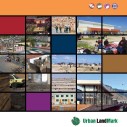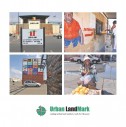Location
"Urban LandMark" is short for the Urban Land Markets Programme Southern Africa. Based in Pretoria, the programme was set up in May 2006 with seven years of funding from the UK's Department for International Development until March 2013. The initiative is now hosted at the Council for Scientific and Industrial Research in South Africa.
Urban LandMark was designed to play a short-term, catalytic role. Between 2006 and 2013 it was financially managed by FinMark Trust. FinMark Trust is already applying the 'making markets work for the poor' thinking in financial and housing markets, which are relevant to the urban land markets question.
What we do
Urban LandMark is working to make urban land markets work for the poor by:
- Defining what 'making markets work for the poor' means for urban land and developing a distinctive voice for this approach,
- Mobilising diverse players, including the private sector and civil society, to come up with innovative ways to achieve this objective,
- Promoting policy dialogue between people , and
- Bringing about change in government policy and implementation, and in private sector praxis.
Five areas of activity
Research
Research projects cover four sectors: people, place, governance and the market, in an integrated way.
Dissemination
Research is disseminated widely to industry, government, NGOs and other interested people.
Support
Individuals affiliated with Urban LandMark are available to government and the private sector to take part in task teams.
Professional development
To ensure industry professionals incorporate MMW4P ideas in their work, we assist with the development of courses and academic exchange programmes as well as forums and seminars.
Networking and advocacy
We develop and maintain relationships with industry and government players, and build partnerships with academic institutions and organisations, local and international, working on urban land issues to share information and participate in joint activities.
Members:
Resources
Displaying 6 - 10 of 36Angola and informal land tenure arrangements: towards an inclusive land policy
Angola, like Mozambique, inherited its legal framework from the Portuguese Civil Code, which was not based on a traditional African concept of community occupation under customary law. With Portuguese settlement, large areas of land were appropriated for and incorporated into the colonial cadastre (the formally surveyed and officially recorded land boundaries of the land concessions granted by the state). After winning independence from Portugal in 1975 the new Angolan government, influenced by socialist principles, affirmed the constitutional role of the state as the owner of all land.
Managing urban land: a guide for municipal practitioners
Urban land markets have a profound effect on how well poor households are able to access the jobs, amenities and services offered in the city. But often the way in which this market works frustrate attempts to open up better located living and business opportunities for poorer urban households and communities, despite government policies and programmes intended to address these challenges. The challenge in South Africa is even larger because of worsening poverty and inequality, and the continuing growth of cities through urbanisation.
Managing urban land
Urban land markets have a profound effect on how well poor households are able to access the jobs, amenities and services offered in the city. But often the way in which this market works frustrates attempts to open up better located living and business opportunities for poorer urban households and communities, despite government policies and programmes intended to address these challenges. The challenge in South Africa is even larger because of worsening poverty and inequality, and the continuing growth of cities through urbanisation.
Improving land sector governance in South Africa implementation of the land governance assessment framework
Land governance and administration are critical for achieving economic growth and development in any country. It is within this context that the World Bank introduced the Land Governance Assessment Framework (LGAF) for identifying specific areas for land reform while also providing a means for monitoring.
Taking stock: The development of retail centres in emerging economy areas
The last decade has seen a significant increase in the number of retail centres being developed in 'emerging economy' areas - townships and rural areas - in South Africa. In Soweto, for example, at least six shopping centres have opened their doors since 2005. Even in the townships of smaller South African cities, shopping centre developments have sprung up, changing the face of commercial transactions for many residing in these areas.





